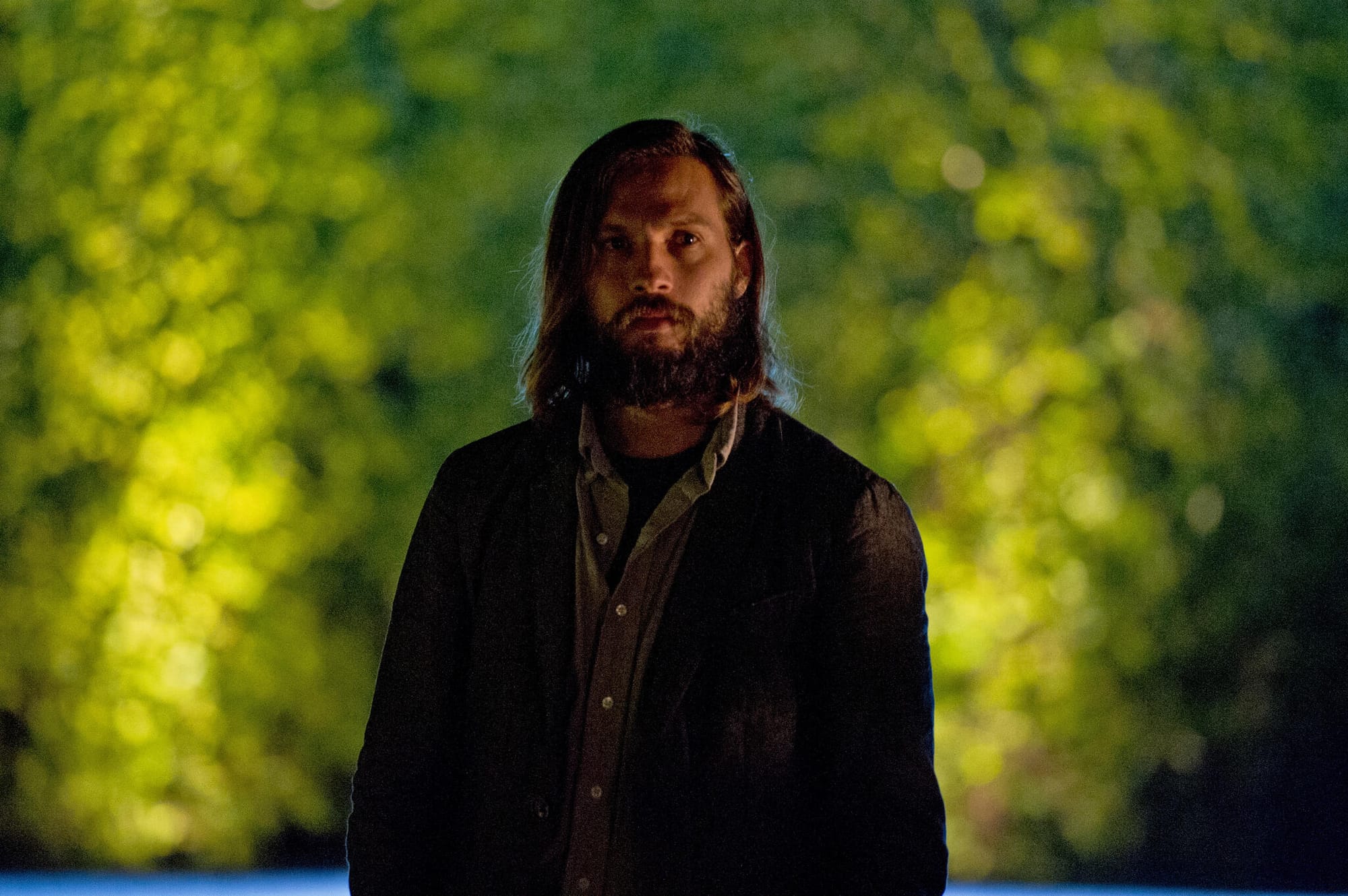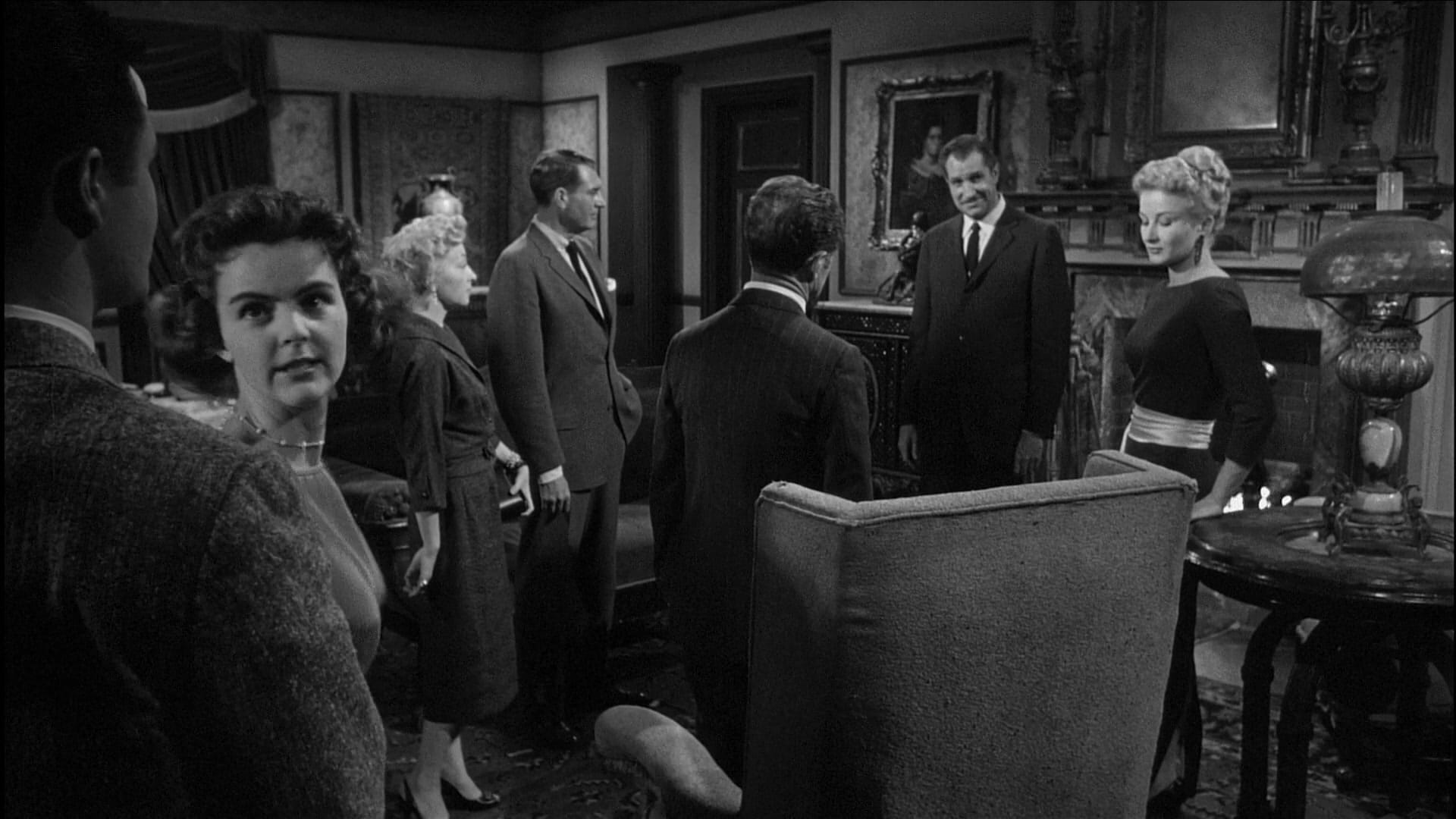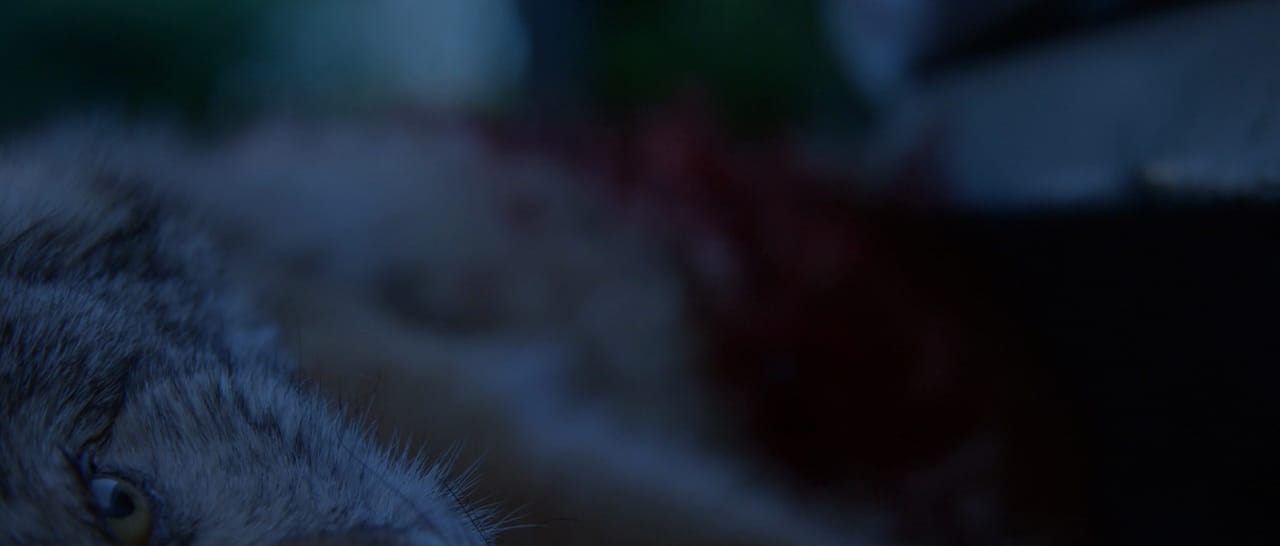The Invitation 10 Years Later: Online Cults and New Age Nihilism

"A lot of people think we're crazy. But I doubt they're as happy as we are."
It has been ten years since the premiere of director Karyn Kusama's psychological-horror film The Invitation premiered at SXSW. Later widely released in 2016, the film brought a breath of fresh hell to the "dinner-party-gone-wrong" concept. Kusama's lessons of grief, suffering, and nihilism immure the audience within the paranoia of the film's lead, played by Logan Marshall-Green, from the primal opening scene to the doomed final frame. Initial responses to the film found audiences and critics praising a well-crafted narrative around a familiar horror setting and grounded performances from a cast that new how to collectively raise the tension to compliment Kusama and cinematographer Bobby Shore's warm stillness. As the years went on, the film's message and themes seemed to simmer back to the surface amidst a rising new reality. Since the film's debut, a rise of online new age spiritual movements, and "life coaching" grifters with ties to extremism have created a shared culture of regression to an antisocial reactionary philosophy through content creation. Since then, these movements have crept their way offline and into mainstream discourse, even seating acolytes of these movements into political appointments and shaking hands with the powers that be. These new movements, and their current grip on our culture, warranted a new read of the film, in what it may, or may not have been aware, what it was foreshadowing.
For fans of the horror genre, The Invitation's familiar plot is a refreshing spin on a tried and true setting and narrative. The example that continually came to mind was William Castle's House on Haunted Hill (1959). This being a prominent example of a plot surrounding unsuspecting guests invited to spend the night in a labyrinthine mansion for a chance to win $10,000. Vincent Price's trademark gothic literary charm is in full-swing, and immediately has the audience enjoying themselves as the plot reveals how the guests might not be as innocent as they seem. The use of the single-setting and gothic overtones set the stage for a macabre "house of horrors" tale, in which unsuspecting guests accept an invitation to their deaths. In a modern sense, this trope is pure theater, and as darkly enjoyable as a game of Clue. In comparison to Kusama's modern approach to this setting, we might recognize Castle's film as consisting of characters manipulating our fear of death as an inevitable truth about man's treacherous nature, but still, House on Haunted Hill remains tethered to its fun gothic trappings to warrant to much of a deep dive into this concept. Instead, it demonstrates a stark changing of the times, and the difference in hosting styles of each film's antagonists to disguise a sinister architect's master plan. There is more uncanny fear raised in Kusama's hosts - the warm and normalized David and Eden, than with Vincent Price and Carol Ohmart's eccentric and wealthy Frederick and Annabelle Loren. Kusama understands our current culture's trepidation to toxic positivity, and overly-soft personalities, as they are often found to be a disguise held up by toothpicks.

Kusama's take on this concept features, instead, an invitation to a dinner at a lavish home in the Hollywood Hills. The film opens with the film's grieving protagonist, Will (Green) driving his girlfriend Kira to the home of his ex-wife, Eden, and her new husband, David, after reluctantly accepting an invitation to dinner. On the way, Will accidentally strikes a coyote with his car. After taking only a moment to examine the state of the injured animal, Will acts, and swiftly executes the coyote to end its suffering. Will and Kira continue to the home up the winding streets on a quiet, calm evening as the sun is softly setting. From the jump, the audience witnesses the conflict between the brutality of the modern world that, seemingly through fate alone, erases a spirit of the natural world. The innocent coyote's suffering is recognized and sympathized with, but an understanding that one's suffering is only cured through death takes precedent in these initial moments. Our introduction to the film's protagonists, Will and Kira, are instantly thrust into a bottled existential question of life itself, along with the audience. Kusama's stark introduction to these characters immediately displays their primal humanity, with Kira responding more shocked to hitting the coyote than Will, who must immediately view the state of the animal to face the consequence of his unintended imposed suffering on another living being. The choice to accept suffering, and the choice to remove suffering, through our society's constant cycle of conceptualizing death and its weight on our lives, remains at the heart of the film.

Will and Kira are greeted by an eerily warm David and Eden, played by Michiel Huisman and Tammy Blanchard, respectively. Eden, Will's ex, matches her new husband's odd welcoming demeanor adorned in an all-white gown that stands out amongst the other casually dressed characters - Tommy, and his boyfriend Miguel, and friends Ben, Claire, and Gina. Also included are notable guests Sadie, a peculiar character that David and Eden met while on a retreat in Mexico, and Pruitt, played by the fantastic John Carroll Lynch performing as unsettling as ever. The film's soft lighting and still photography highlight the film's ability to trap the viewer in a series of embraces that the audience feels through Green's expertly caged performance, as we see Will reconnect with old friends that appear on eggshells with attempts to embrace him. As the evening proceeds, Will is quietly combating struggles internal and external. It is revealed that he and Eden divorced after being unable to collectively manage their grief over their deceased son. Will also struggles to accept David's appeal to a peaceful evening, sensing that Pruitt and Sadie's presence raises too many questions and that everyone is too casual after spending years apart. Will does his best attempts to Irish-goodbye himself into separate spaces within David and Eden's modern mansion in an effort to calm down, but the paranoia persists.
David and Eden then invite everyone into the living room to discuss their newfound philosophy - a nightmare in of itself for anyone in the audience who recalled the time they couldn't fake a good reason to bail on a bad party. They tell their guests about a movement they joined, along with Pruitt and Sadie, called "The Invitation", which claims to assist those who struggle to navigate death and grief by understanding grief as a blight on one's own lived experience - something to be shed or expelled from the body. David goes to further lengths by showing the group a video produced by the founder of The Invitation, Dr. Joseph preaching to a small following, and then seen next to the bed of a dying woman whom he whispers affirmations of peace unto death as she takes her final breaths. The audience is never introduced to Dr. Joseph outside of David's laptop, establishing David and Eden's attachment to his teaching at this point to be parasocial. It is partially implied that they did meet him in person based on their explanation of how they met Sadie and Pruitt, but their attachment to him is carried online only at this point in the narrative. Dr. Joseph evokes that unsettling familiarity we know often from personal experiences, where a friend or family member, claiming a newfound spirituality, or political affiliation, has revealed that influence came from an online figure, often one they have never met offline.

Kusama addresses grief as the shared experience of all mankind, and the tainting of managing that grief from a parasitic unreality manufactured by false prophets that allow one to declare themselves exempt from their own humanity. Self-appointed gurus, life coaches, influencers, and even fitness trainers are titles that have started to chip away at any good faith previously had in the public eye amidst a slew of content creators having emerged that use those titles to package a way to cultivate a devoted following. After the following has been attained and the podcast circuit begins, we often see these content creators adopt an armchair philosopher spin in which they can link their original message with an expanded one that attempts to address larger concerns. Even "financial advisor", has become synonymous with the "grindset/hustle culture" content slop that passes itself off as genuine financial motivation to con others into MLM schemes and crypto rug pulls. Give them an hour on a podcast and you might find they also aren't afraid to chime in with their two cents on a right wing culture war take, or their thoughts on a conspiracy theory or two. At best, we get to dunk-post about their batshit takes as they remain regulated to the world of podcasts. At worst, they metastasize along with their following, and they grow their influence independent of mainstream media, and cultivate themselves into something much worse.
Familiar online villains Andrew Tate, Jeff and Shaleia Divine, Amy Carlson, Jodi Hildebrandt, and Ruby Franke are names now inseparable with the online sludge of grifters who release content laying a foundation for their theories on solving society's great issues, followed up with links to their outrageously priced online courses. The cult leader's message is simple: you are broken as a result of a false reality and societal norms built on lies, but they can fix you. We are dealing with a new crop of evil created by those who acted on an opportunity on how to take the time-tried tradition of being a cult leader online to increase viewership in ways that David Koresh only dreamed of. Understanding the road that was paved to the tragedy at Waco, given our current cultural and political climate, is all the more reason to pay closer attention to the reality separation rhetoric espoused by these grifters. Their nihilistic absolutism, disguised as offering a re-framing of reality, have declared our country, and the world at large, to be in a state of irreparable failure as they release content urging viewers to retreat from any sense of hope, community, and a drive to work for a better tomorrow in any collective sense.
Karyn Kusama's use of the wealthy Californian setting and plot revolving around a dinner party act as both a subtle reflection of the failed hippie movement, and as a communion to welcome the arrival of its reanimated rotted corpse that we see sweeping the country today - the modern new age movement. In the decades since California saw thousands of individuals disenchanted with the American dream, and often life itself, make a pilgrimage to a never-ending spiritual retreat that many believed would usher in an American utopia, we've seen several iterations of movements based on those core tenants appear in pockets of culture. As our world continues its struggle to address and confront the ravages of interlinked imperialism, capitalism, extremism, and religious psychosis, broadly speaking, we see a modern new age push towards adopting an approach that favors a wholesale rejection of the modern world, and any progress that might break through the chaos, as untrustworthy. This doomer mentality and black-pilled nihilism was often never associated with new age spiritual philosophy and its aesthetics, but these ideas have crept up before. The famous Timothy Leary quote "Turn on, tune in, drop out" that embodied the counterculture ethos takes new meaning when recalling it now, and seeing it applied to these extremist fanatical sermons accessible to millions that urge them to leave behind a world that, in their eyes, has fallen.
It's been well documented how the Summer of Love/Hippie movement had their ideas stamped out in the years that followed by a panicked right wing reactionary resurgence, and a split between more tactical revolutionary groups that understood peace signs might only go so far against imperialism, white supremacy, and capitalism. Those who only sought guitar-strumming, pot-smoking escapism from their given situation might not have been up to the task and, literally or figuratively, just went home. Looking back at the end of that era, we often look past the commodification, privilege, and predatory nature that burnt out any good will the hippies might have had in the years of "tune in, turn on, drop out". Arguably, the most notable public shattering of the aesthetics of the hippie movement came in the summer of 1969, when Charles Manson ordered his harem to execute several residents of a lavish California ranch in an effort to frame left wing black revolutionaries and activists for the murders and start a prophesied race war, after which he and his followers would birth a new white ethno-civilization on the ruins of the former United States.

This is not meant to wrap up The Invitation as a jab at your older relatives who grew their hair out but eventually settled down into real life with a job and a family. Rather, Kusama's film can be a bleak dramatization through which an examination of what the hippie movement spawned: individuals unwilling to accept reality paved with grief and despair who decided that they should be made exempt from enduring as every other human must. This drive for escapism and bending of reality opens an individual to be exploited by those who claim to have answers, or a cure, in an endless cycle of abuse from which freedom is often only possible through professional guidance and psychological assistance. We hear the stories of shock many experience when their seemingly normal friend or family member who has everything to live for suddenly withdraws from reality and establishes themselves as a spiritual warrior - one who seeks ultimate truth, and who sees through the lies of modern society. The Invitation is an offer to examine how a death cult is birthed through unattended grief and a culture of privilege that spawns a community that sets itself apart from the human experience. This unattended grief is an invitation for an opportunist to espouse their belief that pain is unmanageable, and that life will not continue in any meaningful way.
Today, profit, privilege, and death are intertwined from the jump, as we see that there is no longer a grand design that involved a track suit and pair of Nike's from the start, but rather a half-cocked non-plan where those pulling the strings are playing loose and fast with any real philosophy to see what they can get away with, and how much. These online figures operate entire parasocial think tank media enterprises aimed at confronting their own misconceptions of reality, and are shooting from the hip as to what their proposed solution is. A notable example of this logic is found in the Love Has Won movement, and their leader, Amy Carlson, who died after ingesting large amounts of colloidal silver which the cult had been promoting as a cure to COVID-19. Carlson abandoned her children to indoctrinate others into an antisemitic QAnon adjacent belief system that she was a reincarnated spiritual being sent to guide lost souls in the struggle against a cabal of elites (Jews, according to their doctrine) who have lied about, and manipulated, major historical events like the Holocaust, COVID-19, and the Sandy Hook massacre, in an effort to oppress our civilization. An HBO documentary featured Carlson's methods for profiting off of her followers as she pieced together a nonsensical narrative to assure them that they were too unique and special to fundamentally exist in the chaos of the modern world with the rest of us. The cult now exists in various offshoots, most notably 5D Full Disclosure and Joy Rains, both of which still create video content to promote their beliefs.

The nation also saw long overdue charges of child abuse finally given to Jodi Hildebrandt and Ruby Franke, who ran a media enterprise under the banner of parental coaching. Their video content was branded as professional courses and sold as such by Hildebrandt, while Franke was the infamous star of the "Momfluencer" YouTube channel "8 Passengers", where her vlogging content often depicted her unusual parenting methods that she clipped and curated to promote alternative parenting methods, which ended up being the abuse they were both convicted of. While not explicitly using LDS doctrine that they ascribe to as members of the church, Hildebrandt and Franke still spoke in suggestions of a spiritual war in a more generalized sense. Familiar to those who grew up in evangelical communities, this ideology highlights the reality-separating motives for the violence they enacted on their children. They offered advice and coaching sessions for parents to combat forces of evil within young children to keep them from straying from God's light into secularism, and remain steadfast in their obedience to their parents by means of cruel and unusual punishments, neglect, and depraved abuse. They deemed themselves to be saviors and harbingers of a great truth that the modern world was keeping from you. Much like the teachings of Dr. Joseph in the film, their philosophy demanded that pain be inflicted on innocent lives to exorcise a falsely perceived flaw within humanity as a whole. Their products offered a way for wealthy families suffering from religious psychosis, often due to unchecked reactionary sociopolitical misconceptions, to unite under their teachings to keep children from having to experience and harness their emotions in a natural and productive manner.

The film's antagonists - David, Eden, Pruitt and Sadie rev up the paranoia the audience feels through Will with an allure of comfort and serenity. Will must be invited within David and Eden's home under the false sense of safety and comfort in order to be forcefully converted to Dr. Joseph's teachings. Kusama flips the notion of "well vs unwell" in terms of appearance with Will and Eden, with Will introduced as seemingly less well than Eden, who appears in an angelic white gown, styled hair, and a soft allure, as if born again into innocence. Will, on the other hand, wears his pain that he experienced in his dark clothing, grown out hair, and rugged beard. The audience does not lose their sympathy for Will as the plot unfolds, but rather grows with his paranoia, attributing it less to depression and grief, but being able to sense a realistic threat that he might not have been as privy to if he shared Eden's born-again dismissal of the pain and suffering in the world. He is even able to share a laugh with Ben about their failed business, highlighting Will's understanding and acceptance of life's ups-and-downs. Eden, constantly forcing a calming vocal tone when talking to others, softly glides throughout the house as if existing on a separate plane from the other guests, refusing to hear anything other than soft spoken happiness from her guests.

David, Eden, Pruitt, and Sadie embody the cult's proof of concept "changed-for-the-better" characters through Dr. Joseph's teachings. David alludes to his former life of corporate hedonistic excess as a record label executive, Pruitt's admission of murdering his wife, and Sadie's unwanted and unprovoked sexual advances towards Will that reveal her to be clearly in a great deal of pain, but working through it, we assume. These antagonists that stay committed to the film's final act are empowered through Dr. Joseph's false promise, but also by the belief that their failures are irreparable sins that they cannot face, no matter how indoctrinated into Dr. Joseph's teachings they believe themselves to be, and must be placed upon the innocent. It's the abusive logic of "if I can't have you, no one can", but in reference to life itself. These are characters that combine the rancid combination of malice and privilege that prevents them from accepting this world as anything other than the place that was supposed to make them happy and successful.
Dr. Joseph's videos being shot and distributed remotely from a foreign country where he hosts his retreat point at a subtle exclusion of anyone who can't afford the time and cost necessary to escape their realities. David and Eden - wealthy, white, and unable to comprehend grief, were able to remove themselves from reality and found themselves turning to a prophet that could give them the escape they desired. This film's version of the eccentric archetype mentioned earlier in comparison to Vincent Price is no longer a present architect of malice pulling strings on the guests' fate. Instead, that figure is confined in a series of saved videos on a laptop shown someone attempting to earn trust through indoctrination. International sex trafficker and brief reality television star, Andrew Tate, has promoted life coaching classes with price tags up into the thousands with the option to join an exclusive Discord server, and the opportunity to join him for a men's retreat in Romania. A Vice documentary and interview with Tate at his compound featured attendees that handed over their incomes to Tate for his course, showing that they could afford to leave their families for a week learn how to be a better husband and father, as they struggle with what they believe to be a world in which men are no longer accepted. This belief stems from insecurities and anger towards modern feminism, and also sometimes fears of that cabal of elites (antisemitism again) eradicating masculinity from western civilization. This is that same cabal that the Love Has Won hippies believe to be responsible for their issues with the world as well, highlighting an interesting overlap in extremist cult beliefs.
In the film's climax, Will erupts with anger at everyone's dismissal of their loss, and retreats again to calm himself after David urges him to stay. Retreating to his son's old room, now converted to David's office, Will sees David lighting an odd red lantern in the garden as he solemnly looks out over the hills. He then opens David's laptop containing a another video made by Dr. Joseph, in which he discusses the difficulty in taking the next steps of his process. Dr. Joseph's process proves Will's paranoia to be entirely accurate, as dinner is finally served. Will, unable to contain his fears any longer slaps the wine out of everyone's hand for fear it contains poison. As the group lashes out at Will, Gina drops dead from a single sip. Shock and horror take hold of the group, as David and Pruitt reveal a sidearm and begin to execute the guests to fulfill the prophecy. Seeing the horror firsthand, Eden gets cold feet about the process and breaks down, unable to commit herself to David's cold brutality as he hunts down the guests. She wounds Will with a sidearm, only to turn the gun on herself, apologizing to Will in her final moment. In the ensuing chaos, Tommy kills David before he can execute Kira and Will. Kira kills Pruitt after a struggle where his allegiance to his own wrath blooms, revealing his true nature. Will, Kira, and Tommy survive the massacre and finally make it outside, only to witness other red lanterns being lit across the hills as the sounds of violence rage, indicating that this evening's dinner party was part of a coordinated mass murder-suicide orchestrated by Dr. Joseph.

During a re-watch to celebrate the anniversary of the film, the character of Dr. Joseph felt all the more ominous and relevant in relation to Kusama's chosen setting of a wealthy dinner party on a quiet evening in the Hollywood Hills. Previously he might've only been established as the wizard behind the curtain shown through David's laptop as a nod to our digital age. Online-based cults preaching esoteric and radical views were mostly found in those corners of the internet that used to be just corners. Ten years later, those corners are now just our daily feeds. Kusama's atmosphere of dread and horror shows the merging of past new age spirituality, and the forgotten rot within, with the current epidemic of allegiance to online false prophets promising salvation. Those in a modern and privileged culture, refusing to comprehend the well known struggles of life, are dismayed by the demand for active participation and mutual responsibility to create a sustainable world, as it requires confronting uncomfortable truths. The violence emerges when they declare that they aren't willing to accept less, and won't accept others for their will to endure. As we see in the film's final frame, this was never just about holding a small group hostage who were lured to a dinner party to be butchered. Rather, we see indoctrinated people manipulating and trapping those of us struggling with the suffering in the modern world by doing the best we can with what we've got. They demand we must to bear witness to a malevolent hyperreality, one vomited into existence from the mouth of false prophets declaring our world to be just as dead inside as they are, and the promise that there is no tomorrow but death.

